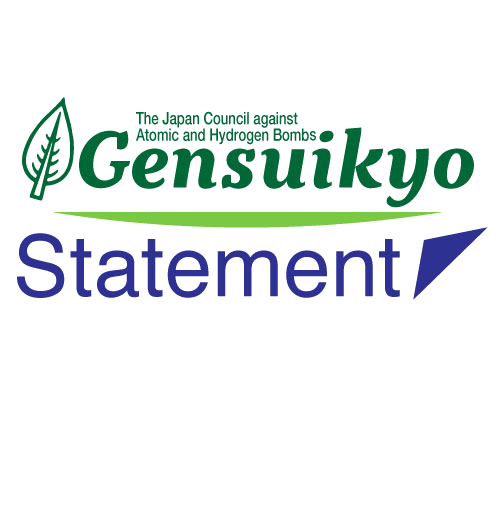Statement for the First Meeting of States Parties to the TPNW:
Japan Council against A and H Bombs (Gensuikyo)
June 21, 2022
On the occasion of the First Meeting of State Parties to the Treaty on the Prohibition of Nuclear Weapons (TPNW), we express our deep respect to all the governments, international organizations and civil society organizations that have contributed to the adoption and entry into force of the TPNW. We wish you every success in this meeting.
As everyone is deeply concerned, the world is facing the war launched in violation of the UN Charter and the danger of actual use of nuclear weapons. We hope that this meeting, having established the norm and rule of the total prohibition of nuclear weapons, will send a strong message that there should never be the use or threat of use of nuclear weapons.

At the same time, we know that in spite of backlashes, the abolition of nuclear weapons represents the major direction of the world. The ratification of the TPNW by 61 countries, the signing by 86 countries, the overwhelming support of the resolution on the TPNW at the UN General Assembly, and even more overwhelming support shown by the outcome of every opinion poll thus far conducted are all eloquent evidence of it.
The current war in Ukraine is making it clear that the argument of the nuclear weapon states and nuclear reliant states leaders, such as “nuclear weapons deter war” or they “guarantee security”, is not only groundless, but the cause to escalate confrontation by force against force and by nukes against nukes, bringing the whole humanity on the brink of annihilation.
The movement against A and H bombs in Japan, the first country to have suffered the atomic bombing in history, has called for a total ban on nuclear weapons, uncovering with the Hibakusha the truth of the hellish damage caused to people under the mushroom cloud, and facing off against the rosy myth that “the bombs saved countless lives of young people.” This effort is in common with the TPNW’s position to save the task of abolition of nuclear weapons from the narrow viewpoint of “national security” of nuclear powers and establish it as a task to ensure global security by focusing on the humanitarian impact of nuclear weapons.
The policy to “maintain nuclear deterrence as long as nuclear weapons exist” or to rely on nuclear weapons in the name of "nuclear sharing" or "extended deterrence" can no longer hold water ethically or logically. What the world has agreed upon is to negotiate nuclear disarmament and complete it, not to maintain these weapons.
We hope that this meeting will call on the governments that have not yet joined in the Treaty, including nuclear weapon states and nuclear-dependent states as well as their people, to support, sign and ratify the Treaty without delay. Each additional accession to the Treaty, no matter how large or small, will strengthen its normative force as well as people's confidence in a nuclear-weapon-free world.
In addition, we need to remind the P5 and other nuclear powers that irrespective of their differences of opinion on the TPNW and whether it be bilateral or multi-lateral, they have an obligation to pursue and conclude negotiations on measures to eliminate their nuclear arsenals without delay. They should admit that the TPNW is reinforcing the NPT in advancing both nuclear disarmament and non-proliferation, and examine seriously the possibility to cooperate with and join in it.
As to the role of the civil society movements, we welcome that the entire process of the TPNW is proceeding in close cooperation between governments, international organizations and civil society movements.
As said above, our movement traces its origin back to the suffering of Hiroshima and Nagasaki, and to the suffering from the US H-bomb test at the Bikini Atoll, the Pacific in 1954. And since the very start, we have set a ban on A and H bombs to be our goal to run nationwide campaign in cooperation with people all over the world.
We collected millions of signatures calling for the start of negotiations for a ban treaty and presented them to every past NPT Review Conference, in our belief that the key to achieve this goal lies in both the process of negotiations and agreements between national governments and the decision made by the sovereign people in each country.
This time, towards this meeting, we have collected signatures to urge the Japanese government to sign and ratify the TPNW. We are also asking local assemblies across Japan to adopt resolutions calling for Japan’s accession to the Treaty. As of June 3, the number of collected signatures is 1,092,112, and the number of local assemblies which adopted their resolutions is 632.
At the core of this effort is our determination shared by the Hibakusha that the tragedy of Hiroshima or Nagasaki must never be repeated anywhere on earth, as well as our activities to make known to the people inhumanity wrought by the A-bombing. We hope that this meeting will keep its attention to the activities of civil society organizations and reinforce assistance for the Hibakusha and nuclear test victims as well as their efforts to spread their testimonies around the world.

